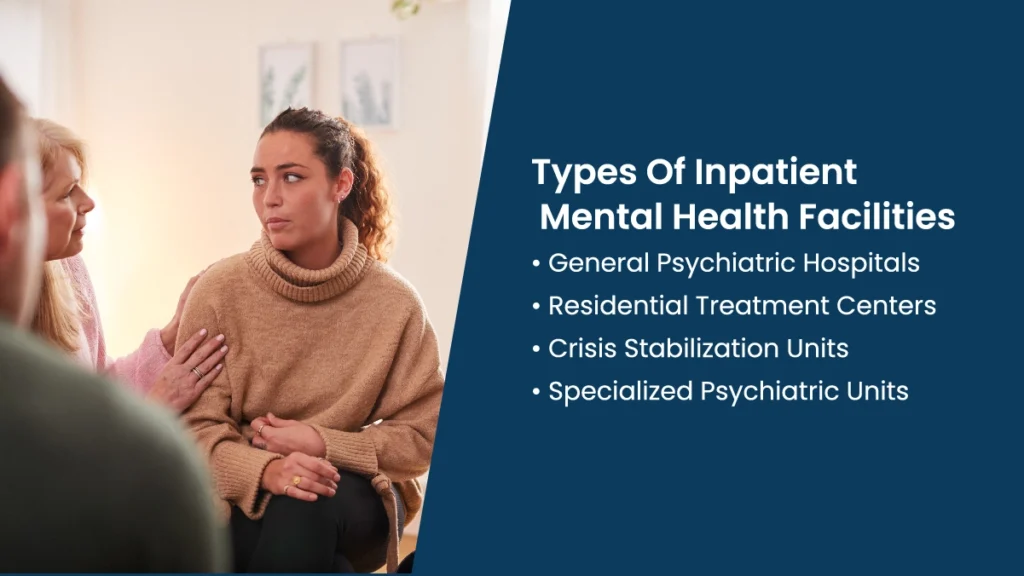An inpatient mental health facility provides care for people with severe mental health issues. It offers a safe place for patients to stay and get treatment.
Doctors and nurses work together to create a care plan. Patients receive therapy, medication, and support. These facilities help manage various mental health conditions like depression, anxiety, and bipolar disorder. These facilities also offer a structured environment for individuals dealing with substance use disorder.
This article will explore the services offered, the benefits of inpatient care, and how these facilities support long-term recovery.
Key Takeaways
Inpatient mental health facilities offer intensive care for severe mental health conditions. Here’s what you need to know:
- There are various inpatient mental health facilities, each serving different needs.
- The admission process for inpatient mental health facilities involves specific criteria.
- Family involvement and expert care are vital for sustaining long-term recovery.
The Haven Detox-New England is a specialized inpatient facility providing comprehensive mental health care. Call us at (844) 933-4145 to learn about our beneficial services.
Definition And Purpose
An inpatient mental health facility provides intensive care for people with severe mental health conditions. These facilities offer a secure environment where patients can receive proper care. Staff members, including doctors and nurses, create personalized treatment plans. The services include therapy, medication, and support for conditions like depression and anxiety.
Inpatient care also involves structured daily activities and family support to aid recovery. According to the National Institute of Mental Health, over 14 million adults in the U.S. have received inpatient care in recent years.
Types Of Inpatient Mental Health Facilities
There are various inpatient mental health facilities, each serving different needs. These include general psychiatric hospitals, specialized psychiatric units in general hospitals, residential treatment centers, and crisis stabilization units.
General Psychiatric Hospitals
General psychiatric hospitals are dedicated solely to treating mental health conditions. They provide comprehensive care, including medication management and therapy. These hospitals often treat severe cases requiring long-term inpatient care.
Specialized Psychiatric Units In General Hospitals
Specialized psychiatric units in general hospitals offer mental health services within a general medical facility. They provide short-term care for acute mental health crises. These units allow for integrated medical and psychiatric treatment.
Residential Treatment Centers
Residential treatment centers offer long-term care in a structured, home-like setting. They provide intensive therapy and support for patients with chronic mental health issues. These centers focus on helping patients develop life skills and coping mechanisms.
Crisis Stabilization Units
Crisis stabilization units provide immediate, short-term care for individuals in acute mental health crises. They aim to stabilize patients and prevent hospitalization. These units offer intensive support and monitoring for up to a few days.

Admission Process
The admission process for inpatient mental health facilities involves specific criteria, referral procedures, and initial assessments. Understanding these steps can help patients and families navigate the system effectively.
Criteria For Admission
Admission criteria vary by facility but generally include the severity of the mental health condition. Patients who pose a risk to themselves or others often qualify for inpatient care. Facilities also consider the patient’s need for intensive, supervised treatment.
Referral Procedures
Referral procedures typically involve a recommendation from a healthcare provider. It can include doctors, psychiatrists, or social workers. Referrals ensure that patients receive appropriate care based on their specific needs.
Initial Assessment And Evaluation
The initial assessment and evaluation involve a comprehensive review of the patient’s mental health. Healthcare professionals conduct interviews and psychological testing, which helps create a tailored treatment plan.
Treatment Methods And Therapies
Inpatient mental health facilities use various treatment methods and therapies to help patients. These include medication management, psychotherapy, group therapy, and recreational and occupational therapy.
Medication Management
Medication management involves prescribing and monitoring psychiatric medications. Psychiatrists adjust dosages based on the patient’s response. This approach helps manage symptoms and improve overall mental health.
Psychotherapy
Cognitive behavioral therapy (CBT) focuses on changing negative thought patterns. Dialectical behavior therapy (DBT) is used to treat borderline personality disorder. Other therapeutic approaches include psychodynamic therapy and humanistic therapy. These therapies explore underlying issues and promote self-awareness.
Group Therapy
Group therapy involves sessions with multiple patients led by a therapist. It provides support and insight through shared experiences, helps patients develop social skills, and reduces feelings of isolation.
Recreational And Occupational Therapy
Recreational and occupational therapy use activities to improve mental health. These therapies include art, music, and physical activities. They help patients develop new skills and enhance their quality of life.
Patient Care And Daily Life
Patient care and daily life in an inpatient mental health facility are structured to support recovery. It includes a structured environment, daily routines, and respect for patient rights and freedom.
Structured Environment
A structured environment provides stability and predictability. It helps patients feel safe and reduces anxiety. Facilities create routines that support therapeutic goals.
Daily Routine And Activities
Daily routines include therapy sessions, meals, and recreational activities. These activities promote engagement and social interaction. Some structured schedules help patients build healthy habits.
Patient Rights And Autonomy
Patients have rights to privacy, informed consent, and participation in their care. Facilities respect these rights while ensuring safety. Autonomy is encouraged to promote self-confidence and recovery.
Role Of Healthcare Professionals
Healthcare professionals play a vital role in inpatient mental health facilities. They include psychiatrists, psychologists, nurses, social workers, counselors, and support staff.
Psychiatrists
Psychiatrists diagnose and treat mental health conditions. They prescribe medications and oversee treatment plans. Psychiatrists work closely with other healthcare providers to ensure comprehensive care.
Psychologists
Psychologists provide therapy and conduct psychological assessments. They help patients understand and manage their conditions. Psychologists use various therapeutic approaches tailored to individual needs.
Nurses
Nurses provide day-to-day care and support for patients. They administer medications, monitor health, and assist with daily activities. Nurses are vital in maintaining a safe and therapeutic environment.
Social Workers And Counselors
Social workers and counselors offer emotional support and practical assistance. They help patients navigate the healthcare system and access resources. These professionals also provide therapy and crisis intervention.
Support Staff
Support staff includes administrative personnel, aides, and other workers. They ensure the facility operates smoothly. Their roles are essential in creating a supportive environment for patients.
Frequently Asked Questions (FAQ)
What happens when you admit yourself to the hospital for mental health?
When you admit yourself to a hospital for mental health, you start by talking to a nurse or doctor. They will ask about your feelings and any problems. You might fill out some forms. Then, you will meet with a mental health professional. They will ask more detailed questions to understand your needs.
You may stay in a special unit in the hospital. This unit is safe and has staff to help you 24/7. They will give you a plan that may include therapy, medicine, and activities. They aim to make you feel better and support your recovery.
What to do if a family member is having a mental breakdown?
If a family member is having a mental breakdown, take them to the hospital immediately. Seek mental health care from a team of professionals. Look into mental health treatment programs in your community.
Inpatient treatment at a psychiatric care center can help, especially for adolescents and those with substance abuse issues. Mental illnesses like mood disorders can disrupt everyday life. Access to inpatient programs ensures they receive around-the-clock care.
Family members should support their loved ones throughout the process. Find the nearest location offering comprehensive mental health services. Early intervention can make a difference in managing mental health disorders effectively.
Embrace Renewal At The Haven Detox-New England
At The Haven Detox-New England, we redefine mental health treatment with compassionate care and innovative strategies.
We surpass mental health challenges through personalized residential treatment programs that integrate therapeutic modalities. Our holistic approach includes comprehensive psychiatric evaluation and medication management tailored to individual needs.We foster recovery with 24/7 nursing care and structured daily activities. Call us at (844) 933-4145 to learn more about our comprehensive services.
Verify Insurance
Let’s get you or a loved one help with a few simple steps.




